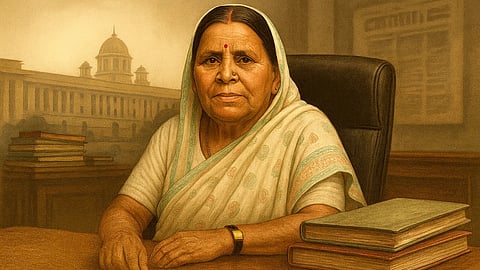
- Home
- NewsGram USA
- India
- न्यूजग्राम
- World
- Politics
- Entertainment
- Culture
- Lifestyle
- Economy
- Sports
- Sp. Coverage
- Misc.
- NewsGram Exclusive
- Jobs / Internships

Rabri Devi became CM in 1997 after Lalu Prasad Yadav stepped down during the fodder scam.
Her tenure faced accusations of poor governance and rising crime, leading to Bihar being labeled “Jungle Raj.”
Today, her son Tejashwi Yadav leads the RJD, carrying forward the family’s political influence.
Rabri Devi, the first and only woman to serve as Bihar’s Chief Minister, completed three consecutive terms in the role. Coming from a backward class, she enjoyed strong support from millions of backward and rural women. However, with no prior political experience, she often faced criticism and controversy throughout her tenure.
Rabri Devi was named after the Indian sweet rabri, following a family tradition. Born in 1955 in Salarkalan village, Gopalganj, she came from a simple background. She married Lalu Prasad Yadav in 1973 and became a mother of nine children before entering politics. Rabri studied only up to the fifth standard at a local village school.
Rabri Devi’s political journey began in 1997, when Lalu Prasad had to resign as Chief Minister after an arrest warrant was issued against him in the fodder scam case. Facing political pressure and fears of President’s Rule, Lalu made a strategic move. On July 5, 1997, he left the Janata Dal and formed the Rashtriya Janata Dal (RJD). Ten days later, on July 15, he proved his strength by winning a confidence vote with 167 of 324 votes.
On July 25, 1997, with his arrest looming, Lalu surprised the state by announcing Rabri Devi as the leader of the RJD legislature party and his successor. This marked her transformation from a homemaker to Bihar’s Chief Minister. Rabri remained in office until 2005 and was the last CM of undivided Bihar.
She was elected three times from the Raghopur constituency but lost both seats she contested—Raghopur and Sonpur—in the 2010 Assembly elections, during which the RJD suffered a major setback, winning only 22 seats.
Rabri Devi faced widespread criticism due to her lack of political experience and education, with many calling her an “illiterate housewife.” Lalu even had to hire a teacher to help her learn to sign her name. Her supporters defended her by saying, “A newborn is not able to speak and walk at birth.”
Critics accused her of being a “rubber stamp” Chief Minister who depended heavily on Lalu’s instructions. She often admitted, “Hum wohi karenge jo hamare saheb hamey batayenge” (“I will do what my husband instructs.”)
Rabri Devi and Yadav family members were implicated in several corruption cases, including the fodder scam, the land-for-jobs scam, and the IRCTC hotel corruption case. In a recent development in the IRCTC case, the Rouse Avenue Court in Delhi on November 11, 2025, rejected petitions filed by Lalu Prasad and Rabri Devi seeking a one-week gap in hearings, allowing day-to-day proceedings to continue.
Rabri Devi’s tenure was marked by allegations of poor governance. Crime rates, including daylight robberies and caste-related massacres, were extremely high. The state’s economy stagnated, recording one of the lowest GDP growth rates in India. Law and order deteriorated, corruption became widespread, governance was heavily caste-centric, and essential services like education and healthcare suffered severe neglect. These conditions earned Bihar the label of “Jungle Raj.” [Rh/SG/VP]
